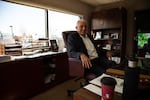If someone pulled onto the lot at Vancouver Auto Group last Friday hoping to buy a new car, they were test driving it alone.
The dealership had just changed policies to keep salespeople out of the car in order to keep everyone six feet apart. Keys were exchanged in hands gloved by plastic bags. Anyone who coughed – even customers – was told to leave.
“It’s not the normal treatment of a customer to say, ‘we think you’re too sick to be here,’ but if a customer appears ill, we really don’t have a choice,” said Jon Creedon, president of the dealership.
The novel coronavirus had already closed bars and restaurants throughout Washington state last week, when Creedon spoke with OPB. Now, Creedon and other Northwest businesses have shut down entirely due to gubernatorial executive orders requiring people to stay home.
A quiet car lot is an issue Creedon must deal with now, but it’s going to be an even larger issue down the road for governments who rely on sales taxes for basic services. For Vancouver, about one-third of its budget is tied to sales taxes.

Jon Creedon, president of Vancouver Auto Group, sits in his office on March 20. Creedon said auto sales have dropped, but he expects they will rebound.
Troy Brynelson / OPB
Vancouver estimates it could lose up to $30 million from its general fund this year as the economy skids. People will dine out less, hold off on buying new cars and even forgo paying certain bills – like a phone bill – that the city is able to tax.
Auto sales are the biggest contributor to sales tax in Washington, according to Creedon. Auto sales kicked in about $5 million to the Vancouver’s general fund in 2018, city officials say.
The construction industry is another big ticket. Vancouver collects money from every load of lumber, concrete and rebar sold – and construction had boomed at places like the city’s waterfront development before the pandemic.
“A large portion of our revenue is dependent on the state of the economy, such as sales tax,” said Vancouver’s chief financial officer, Natasha Ramras. “It’s pretty significant – it’s not small, for sure."
The city’s estimates it could see a 17% blow to its $174 million general fund. The fund pays for police, firefighters, parks staff and street paving, among other areas.
In recent weeks, Ramras said, the city has already put a freeze on most hiring and pulled funding for employee trainings. But no layoffs are planned at this time, she said.
Ramras’ estimates are just that – estimates. The virus’ economic impacts still aren’t clear. The Washington Department of Revenue hasn’t released any forecasts since the outbreak. But state economists reported Thursday that unemployment claims in Washington were already at 133,464. More than 9,000 of those jobless claims were in Southwest Washington, and two-thirds of those in Clark County.
Scott Bailey, a regional economist for the state, said sales taxes aren’t the most important part of a city’s funding equation, but they are vital.
“It will affect service delivery across the board if budget cuts have to happen, and this is a time when we need more services – especially in terms of health care services,” he said. “It’s a big deal.”
Car sales are just one example of high-dollar items that people are shying away from during the economic slowdown, Bailey noted. With restaurants and hotels laying off workers, and entire states ordering most people to stay home, other big purchases may follow.
“I wouldn’t be surprised if home sales drop way down along with car sales, appliances, those kinds of big-ticket things,” he said. “That impacts sales taxes, but also jobs.”
The sudden shift may also upset cities’ plans to grow revenue. Mere weeks ago, Vancouver was pursuing a $30-million-per-year funding package called A Stronger Vancouver that could have been on the ballot this year. City officials said that’s a tougher sell to the public now.
“It’s too soon to tell,” City Councilor Erik Paulsen said. “But what legs it did have are much more wobbly than they were a month ago.”
Vancouver has prepared for a recession, Ramras said. The city has more than $50 million in reserves that it can tap into, but she said the future will depend on how soon the outbreak subsides and how long it takes the economy to hum.
“We are as prepared as we can be after the last recession,” Ramras said, referencing the mortgage crisis about a decade ago. “We haven’t prepared for what we we’re seeing … if it lasts long.”
The federal government’s recent $2.2 trillion stimulus package may not help, either, if the outbreak lasts awhile, Ramras added. She said any checks individuals get will probably come once.
“It will help a little bit but not dramatically,” she said. “It’s not a monthly amount. It’s a flat, one-time amount. Mortgage are monthly. Bills are monthly.”
She said, at least for now, the city is ready and shouldn’t have to make any “rash decisions.”
On the car lot, Creedon was less concerned about the future of car sales than he was about keeping everyone healthy. He said car sales slump for reasons both big and small – from bad weather or a recession – but a sales peak always follows.
“In the interim, we just need to keep everybody safe and, if possible, everybody employed,” he said.